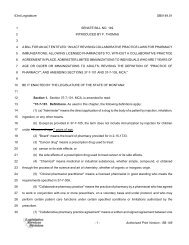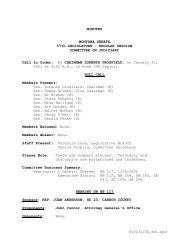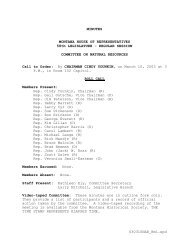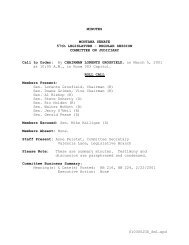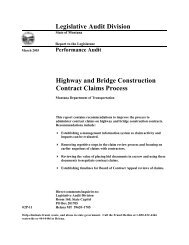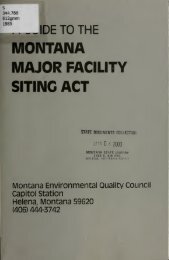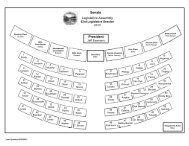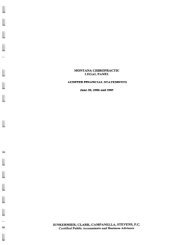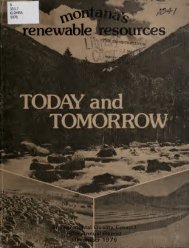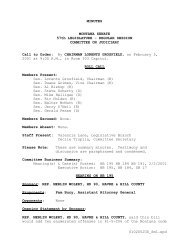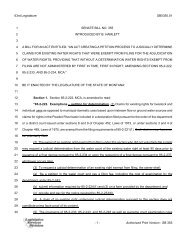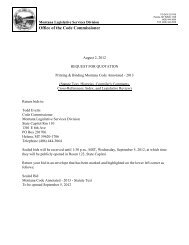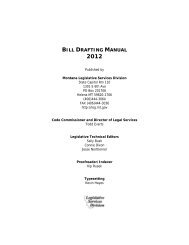- Page 1 and 2: Public Benefits and Private Rights:
- Page 3 and 4: Helena Public Hearing. December 1.
- Page 5 and 6: The Eminent Domain Subcommittee (Su
- Page 7 and 8: The location of the right-of-way of
- Page 9 and 10: land to locate the pipeline. She ad
- Page 11: in a case in Illinois a pipeline wa
- Page 15 and 16: PUBI-IC COMMENT - BILLINGS Dena Hof
- Page 17 and 18: use the power of eminent domain sho
- Page 19 and 20: were no answers provided. 'The Legi
- Page 21 and 22: telecorr~munication lines, and rail
- Page 23 and 24: EMINENT DOMAIN DRAFT STUDY REPORT P
- Page 25 and 26: certain criteria for State and Fede
- Page 27 and 28: Exhibit 6 from last meeting -- Requ
- Page 29 and 30: circumstances, which is exactly wha
- Page 31 and 32: ight to all of the surface damage p
- Page 33 and 34: I support eminent domain reform. I
- Page 35 and 36: of Property" should also be rejecte
- Page 37 and 38: that only a very few condem~iations
- Page 39 and 40: approved use, the bill should requi
- Page 41 and 42: While we don't believe this legisla
- Page 43 and 44: projects delayed it is the citizens
- Page 45 and 46: the subcommittee have been clear th
- Page 47 and 48: Cenex supports the findings and rec
- Page 49 and 50: up front. State and federal governm
- Page 51 and 52: Cenex supports the findings and rec
- Page 53 and 54: draft legislation, which does the f
- Page 55 and 56: -The "Necessity/Public Interest" is
- Page 57 and 58: I support eminent domain reform. I
- Page 59 and 60: e used as a guide to better underst
- Page 61 and 62: MEIC's testimony at the December 1,
- Page 63 and 64:
Northern Plains Resource Council Ma
- Page 65 and 66:
BROWN LAW F w P.C. Page 2 April 1 1
- Page 67 and 68:
BROWN hw P.C. Page 4 April 1 1, 200
- Page 69 and 70:
Page 2 March 3 1. 1000 3. Yearly fe
- Page 71 and 72:
Montana Environmental Quality Counc
- Page 73 and 74:
The five eminent domain reform bill
- Page 75 and 76:
Lee, Krista From: 3ent: To: Subject
- Page 77 and 78:
mlt~ Montana Independent Telecommun
- Page 79:
THE .. *I& i k end o* CQALITBON Jan
- Page 82 and 83:
knowledgeable buyer will pay and a
- Page 84 and 85:
volume gasoline pipelines at the ti
- Page 86 and 87:
January 23, 2000 Krista Lee Environ
- Page 88 and 89:
3. The land value be based on whate
- Page 90 and 91:
NFW SECTION, Section 1. Limitation
- Page 92 and 93:
Memorandum TO: Aaron Browning FROM:
- Page 94 and 95:
MEMORANDUM MONTANA DEP~TMENT OF '+
- Page 96 and 97:
v 6 - c U :Preferable, maybe. Desir
- Page 98 and 99:
Public water supply wells susceptib
- Page 100 and 101:
Lee, Krista From: Alan Roiston [ala
- Page 102 and 103:
11. Whether a condemning corporatio
- Page 104 and 105:
BULL MOUNTAIN LANDOWNERS ASSOCIATIO
- Page 106 and 107:
APR- 3-00 MON 1145 PM THE PRINTERY
- Page 108 and 109:
. . . . . . . . . . . .. . . . . .
- Page 110 and 111:
Environmental Quality Council March
- Page 112 and 113:
Northern Plains Resource Council Ma
- Page 114 and 115:
These examples illustrate that clea
- Page 116 and 117:
is not already appropriated to some
- Page 118 and 119:
Schoro v. Anaconda Co., 187 Mont. 3
- Page 120 and 121:
the abuse. But the changes being co
- Page 122 and 123:
DM1 ASPEN BOWER - COLORADO SPRIIUq
- Page 124 and 125:
HOLLAND & HART ATTORNEYS AT LAW LLP
- Page 126 and 127:
Environmental Quality Council April
- Page 128 and 129:
GOVERNOR SI.ARC R\CICOT HOCSE SIESI
- Page 130 and 131:
ROCKER SIX CAlTLE CO. HC 84 BOX 205
- Page 132 and 133:
Hi Krista, This letter is in regard
- Page 134 and 135:
NA COAL COUNCIL 01 COLONIAL DRIVE H
- Page 136 and 137:
03/31/00 FRI 11:18 FAX 1 406 761 83
- Page 138 and 139:
BROWNING, KALECZYC, BERRY & HOVEN,
- Page 140 and 141:
EQC Eminent Domain Subcommittee-Pub
- Page 142 and 143:
No matter what. No criteria is appl
- Page 144 and 145:
On the issue of the use of taken la
- Page 146 and 147:
3UDcommlttee-Pu blic Hearing WALLAC
- Page 148 and 149:
EQC Eminent Domain Subcommittee-Pub
- Page 150 and 151:
EQC Eminent Domain Subcommittee-Pub
- Page 152 and 153:
EQC Eminent Domain Subcommittee-Pub
- Page 154 and 155:
h.VC Lvl~ll~ent Oun~will Subcummitt
- Page 156 and 157:
1. hcgv Conservation. (Using less e
- Page 158 and 159:
In conclusion, it is important to r
- Page 160 and 161:
changed. Thosc who seek to condemn
- Page 162 and 163:
EQC Eminent Domain Subcommittee-Pub
- Page 164 and 165:
*.I - EQC Eminent Domain Subcommitt
- Page 166 and 167:
ights-of-way along with other uses,
- Page 168 and 169:
STANDARD CORM 199 Pr*9c*bd by DOz/U
- Page 170 and 171:
Other exemptions, waivers, or reduc
- Page 172 and 173:
-168- Volume Ill: Public Comment U.
- Page 174 and 175:
Ensuring just compensation: In most
- Page 176 and 177:
company by statute, in order to obt
- Page 178 and 179:
Crude Oil and Petroleum Products Pi
- Page 180 and 181:
Mitigation Measures #2 (State and F
- Page 182 and 183:
Burden of Proof EQC Eminent Domain
- Page 184 and 185:
EQC Eminent Domain subcommittee May
- Page 186 and 187:
TABLE OF CONTENTS . Section Page 10
- Page 188 and 189:
PROPOSED MASTER MITIGATION POLICY.
- Page 190 and 191:
DRAFT, 4/9/8 5 Indirect .land loss,
- Page 192 and 193:
DRAFT, 4/ 9/8 5 (5) Impacts During
- Page 194 and 195:
DRAFT, 4/9/85 the possibility of es
- Page 196 and 197:
DRAFT, 4/9/85 21) LARRS requests th
- Page 198 and 199:
DRAFT, 4/9/85 11 impacted communiti
- Page 200 and 201:
DRAFT, 4/9/85 13 appropriate . agen
- Page 202 and 203:
DRAFT, 4/9/85 ( 2 Strict speed limi
- Page 204 and 205:
DRAFT, 4/9/85 (5) A program of nois
- Page 206 and 207:
DRAFT, 4/ 9/ 8 5 b, Local. ambulanc
- Page 208 and 209:
DRAFT, 4/9/85 21 tion and operation
- Page 210 and 211:
DRAFT, 4/ 9/ 8 5 23 ces . These per
- Page 212 and 213:
DRAFT, 4/9/85 (a) quality (b) formi
- Page 214 and 215:
DRAFT, 4/9/85 27 tify new winter ra
- Page 216 and 217:
DRAFT, 4/9/85 29 of these individua
- Page 218 and 219:
DRAFT, 4/9/85 2. Topsoil should.. b
- Page 220 and 221:
DRAFT, 4/ 9/8 5 33 district ;would.
- Page 222 and 223:
DRAFT, 4/ 9/ 8 5 - and/or operation
- Page 224 and 225:
EQC Eminent Domain Subcommittee May
- Page 226 and 227:
Miles City Fish Hatchery Impact Ana
- Page 228 and 229:
Impact Analysis Studies and Propose
- Page 230 and 231:
Impact Analysis Studies and Propose
- Page 232 and 233:
Impact Analysis Studies and Propose
- Page 234 and 235:
Impact Analysis Studies and Propose
- Page 236 and 237:
Impact Analysis Studies and Propose
- Page 238 and 239:
'. ATTACHMENT A 'VIBRATION AND IMPA
- Page 240 and 241:
Study Plan Page 2 . As a condition
- Page 242 and 243:
Study Plan Page 4 Lab Tests -Target
- Page 244 and 245:
Study Plan Page 6 Information neede
- Page 246 and 247:
Study Plan Page 8 Rcfcrcnce List Be
- Page 248 and 249:
United States Department of the Int
- Page 250 and 251:
Bobbi Keeler, FA Coordinator 3 Idea
- Page 252 and 253:
EQC Eminent Domain Subcommittee DEP
- Page 254 and 255:
Robert Ochsner April 5, 1994 Page 3
- Page 256 and 257:
Robert Ochsner April 5, 1994 Page 5
- Page 258 and 259:
Robert Ochsner April 5, 1994 Page 7
- Page 260 and 261:
. Robert Ochsner April 5, 1994 Page
- Page 262 and 263:
Memo--Marylee Norris, John North Fe
- Page 264:
EQC Eminent Domain Subcommittee May



